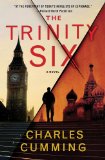Summary | Excerpt | Reviews | Beyond the Book | Readalikes | Genres & Themes | Author Bio

1
"The dead man was not a dead man. He was alive but he was not alive. That was the situation."
Calvin Somers, the nurse, stopped at the edge of the towpath and looked behind him, back along the canal. He was a slight man, as stubborn and petulant as a child. Gaddis came to a halt beside him.
"Keep talking," he said.
"It was the winter of 1992, an ordinary Monday night in February." Somers took an apple from his coat pocket and bit into it, chewing over the memories. "The patient's name was Edward Crane. It said he was seventy-six on his notes, but none of us knew what was true and what wasn't. He looked midsixties to me." They started walking again, black boots pressing through the mud. "They'd obviously worked out it was best if they admitted him at night, when there were fewer people around, when the day staff had gone off shift."
"Who's 'they'?" Gaddis asked.
"The spooks." A mallard lifted off the canal, quick wings shedding water as he turned towards the sun. "Crane was brought in on a stretcher, unconscious, just after ten on the evening of the third. I was ready for him. I'm always ready. He bypassed A and E and was put straight into a private room off the ward. The chart said he had no next of kin and wasn't to be resuscitated in the event of cardiac arrest. Nothing unusual about that. Far as anyone was concerned, this was just another old man suffering from late-stage pancreatic cancer. Hours to live, liver failure, toxic. At least, that was the story MI6 was paying us to pedal."
Somers threw the half-eaten apple at a plastic bottle floating on the canal and missed by three feet.
"Soon as I got Crane into the room, I hooked him up to some drips. Dextrose saline. A bag of amikacin that was just fluid going nowhere. Even gave him a catheter. Everything had to look kosher just in case a member of staff stuck their head round the door who wasn't supposed to."
"Did that happen? Did anybody see Crane?"
Somers scratched the side of his neck. "Nah. At about two in the morning, Meisner called for a priest. That was all part of the plan. Father Brook. He didn't suspect a thing. Just came in, administered the last rites, went home. Soon after that, Henderson showed up and did his little speech."
"What little speech?"
Somers came to a halt. He didn't make eye contact very often but did so now, assuming a patrician tone which Gaddis took to be an attempt at impersonating Henderson's cut-glass accent.
"'From this point onwards, Edward Crane is effectively dead. I would like to thank you all for your work thus far, but a great deal remains to be done.'"
A man pushing a rusty bicycle came towards them on the towpath, ticking past in the dusk.
"We were all there," said Somers. "Waldemar, Meisner, Forman. Meisner was so nervous he looked as if he was going to throw up. Waldemar didn't speak much English and still didn't really understand what he'd got himself involved in. He was probably just thinking about the money. That's what I was doing. Twenty grand in 1992 was a lot of cash to a twenty-eight-year-old nurse. You any idea what we got paid under the Tories?"
Gaddis didn't respond. He didn't want to have a conversation about underfunded nurses. He wanted to hear the end of the story.
"Anyway, at some point Henderson took a checklist out of his coat pocket and ran through it. First, he turned to Meisner and asked him if he'd filled out the death certificate. Meisner said he had and produced a ballpoint pen from behind his ear, as if that proved it. I was told to go back down to Crane's room and wrap the body. 'No need to clean him,' Henderson said. For some reason, Waldemar - we called him Wally - thought this was funny and we all just stood there watching him laugh. Then Henderson tells him to pull himself together and gives him instructions to have a trolley waiting, to take the old man down to the ambulance. I remember Henderson didn't talk to Forman until the rest of us had gone. Don't ask me what he'd agreed with her. Probably to tag a random corpse in the mortuary, some tramp from Praed Street with no ID, no history. How else could they have got away with it? They needed a second body."
Excerpted from The Trinity Six by Charles Cumming. Copyright © 2011 by Charles Cumming. Excerpted by permission of St. Martin's Press. All rights reserved. No part of this excerpt may be reproduced or reprinted without permission in writing from the publisher.
When you are growing up there are two institutional places that affect you most powerfully: the church, which ...
Click Here to find out who said this, as well as discovering other famous literary quotes!
Your guide toexceptional books
BookBrowse seeks out and recommends the best in contemporary fiction and nonfiction—books that not only engage and entertain but also deepen our understanding of ourselves and the world around us.